Best Warhammer 40k Books
Thanks to Black Library, Games Workshop's publishing arm for novels, stories, and background books, there is no shortage of literature if you want to immerse yourself in the grimdark, war-torn future background of Warhammer 40k.
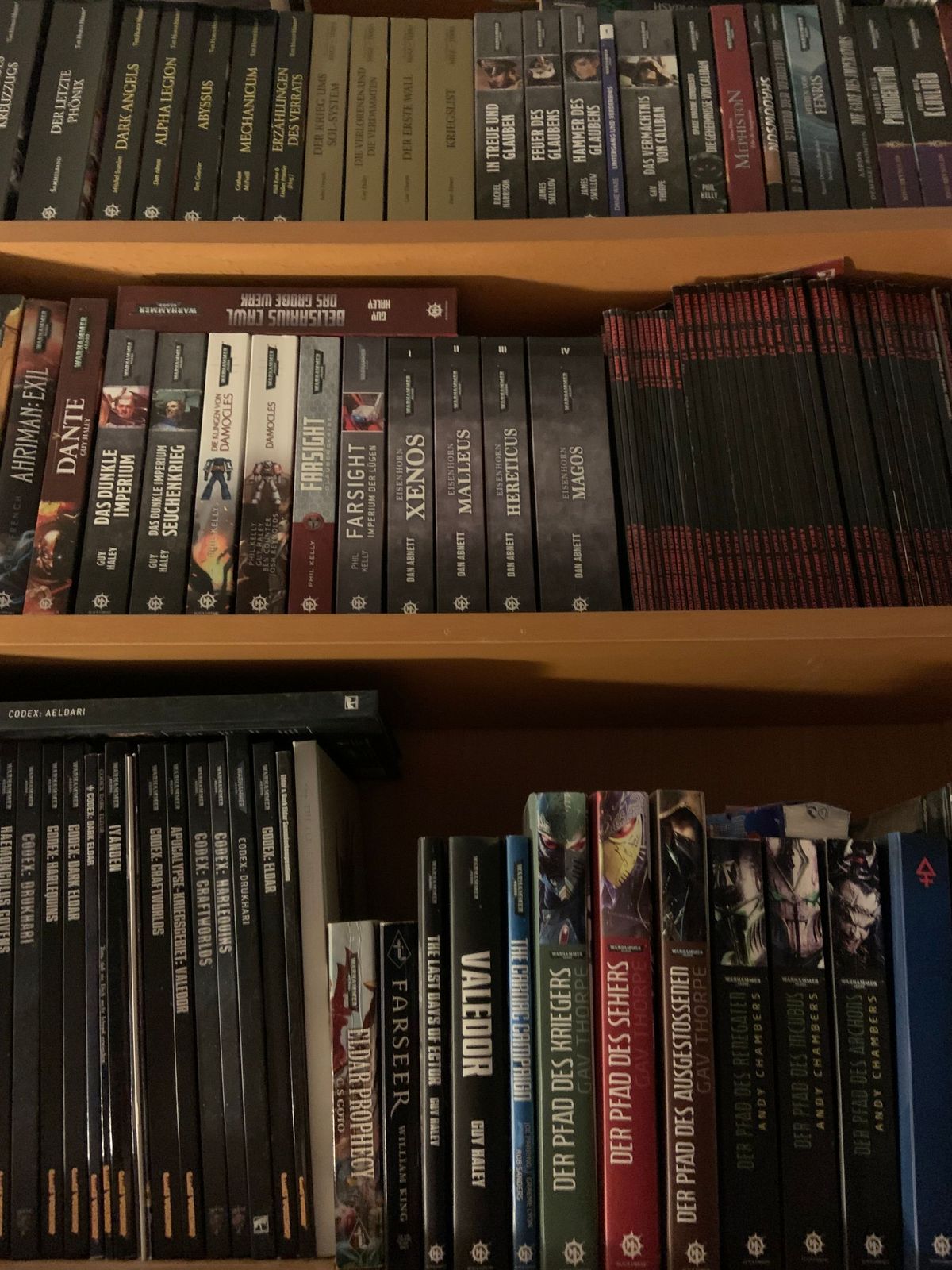
Most Warhammer 40k books are action-packed and written soundly by experienced authors. However, while Black Library probably churns out more printed paper than the Adeptus Administratum, there are some books that stand out, like Titans on the apocalyptic battlegrounds of the science fiction dystopia that we all love! These novels, the best Warhammer 40k books, are what this article is about.
First, we will give you five of the well-deserved classics among the Warhammer books. And then, you'll receive five further tips, five lesser-known novels from the vast archives of Warhammer fiction. Enjoy!
Five Warhammer 40k classics...
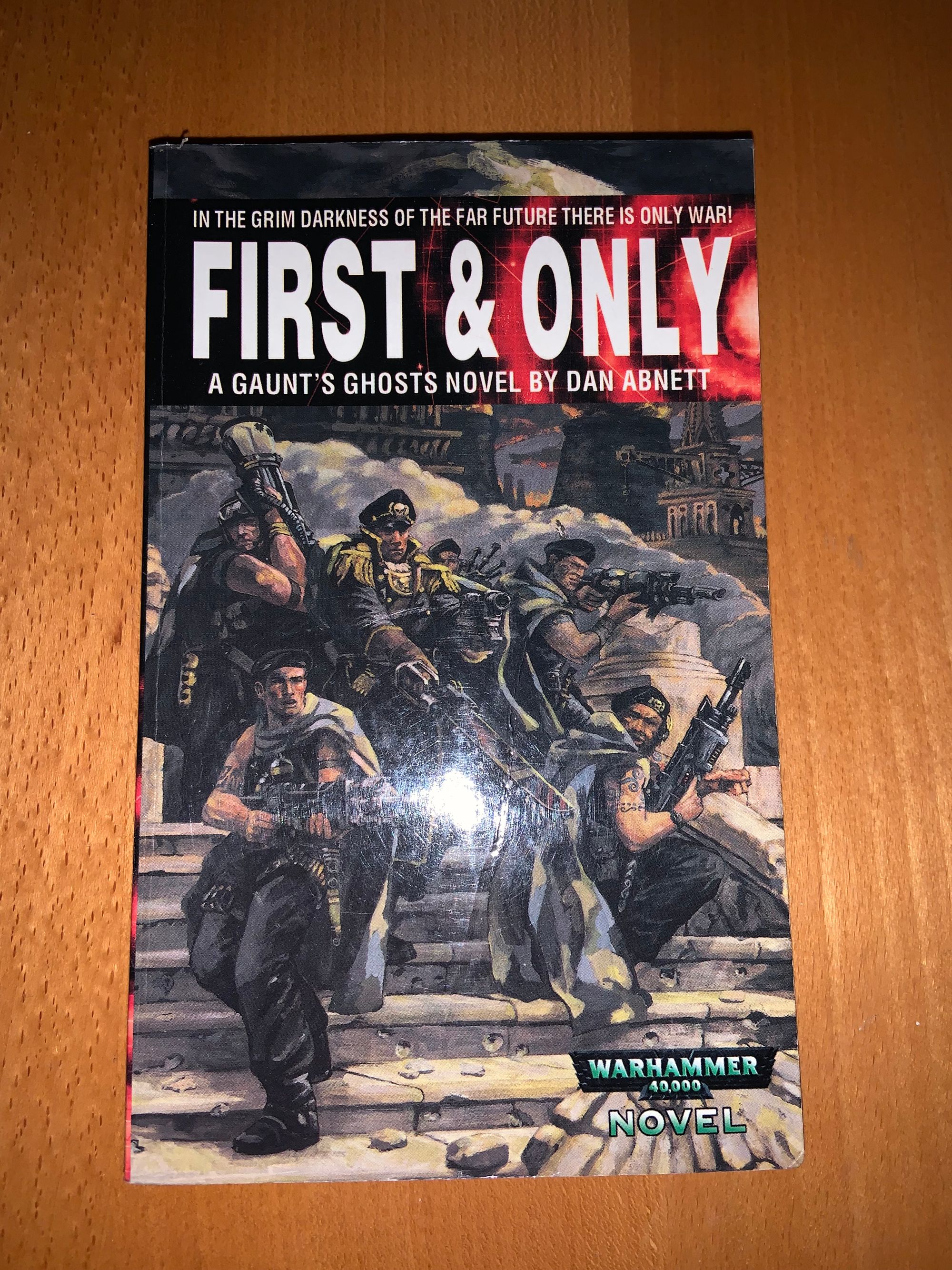
First and Only (Dan Abnett)
First and Only is the first book of the Gaunt's Ghosts series, the novel that established Dan Abnett's fame as an author among the fans of Warhammer 40k and that paved the way for many more novels to come. It is also the first book about one of the Games Workshop games that was released under the Black Library label.
The protagonist, Ibram Gaunt, one of Black Library's most beloved characters, is a Commissar, one of the infamous political officers of the Imperial Guard who are most known for "raising morale" with summary executions. But Gaunt is among the more decent examples of his rank, and when he becomes the commander of the Tanith 1st, a regiment hailing from a doomed forest world, soon nicknamed "Gaunt's Ghosts", he also proves himself as an ideal field commander.
The background of the Gaunt's Ghost Series is the Imperium's crusade to liberate the Sabbat Worlds, which have been conquered by Chaos forces. When Warmaster Slaydo, the leader of the Sabbat Worlds Crusade, is succeeded by the younger Macaroth, the intrigues in the crusade's command staff start to show even in the Gaunt's Ghosts' field operations. The ensuing rivalries between Gaunt's Ghosts and more respected regiments like the Jantine Patricians will continue with other units like the Royal Volpone in later novels. But of course, there are also the armies of Chaos to fight!
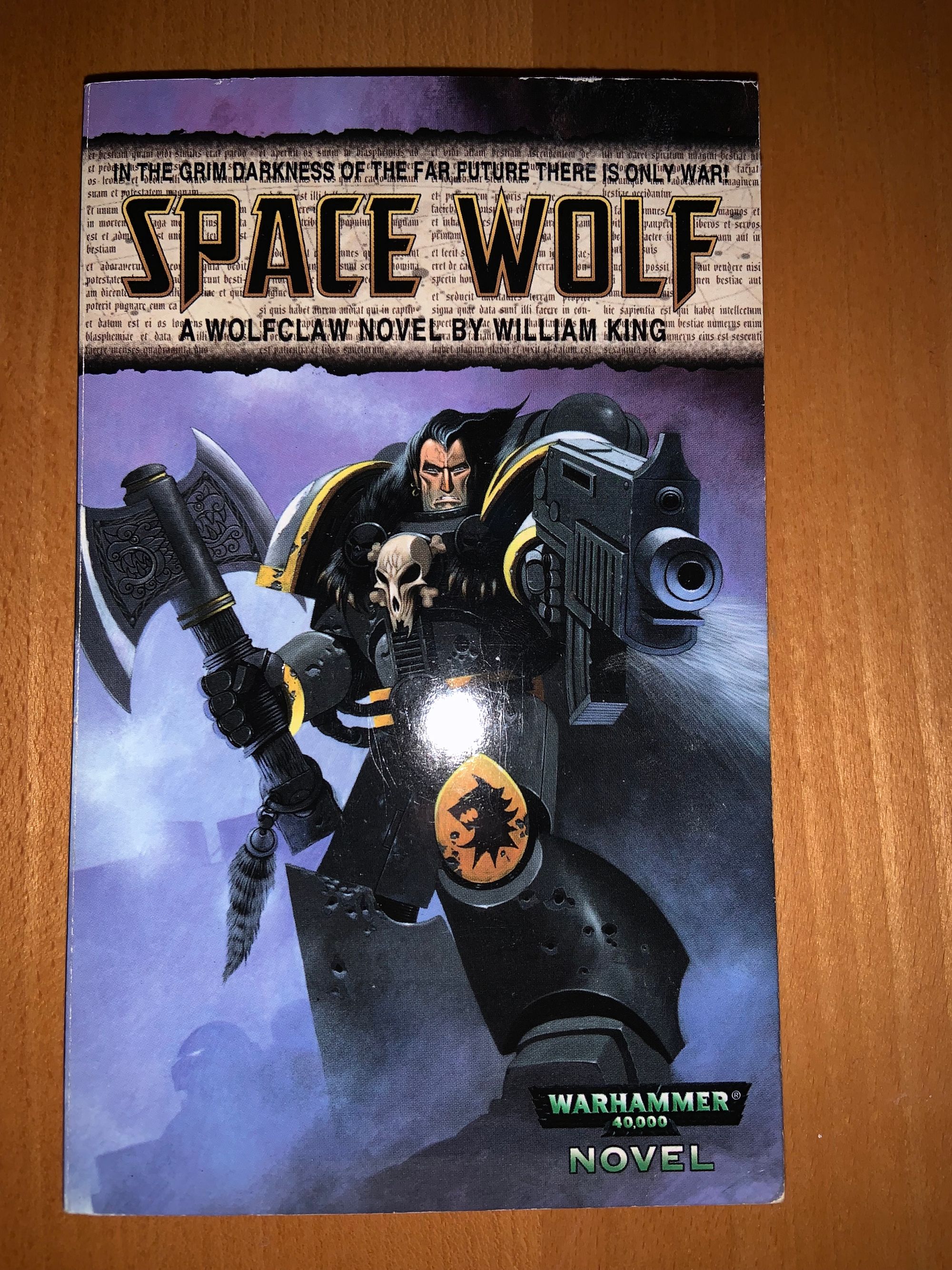
Space Wolf (William King)
This list, of course, needs at least one Space Marines novel! Personally, I found many of the Space Marine books a little dry... I guess if you buy a novel under the label of "Space Marine Battles", and it contains Space Marines and lots of battles, you get what you've paid for. There are some gems in this range though, and some Space Marines novels really explore just what being a geneseeded superhuman feels like and what kind of cultures bring forth the kind of warriors suitable for Astartes recruitment. One fan favorite is the semi-Viking culture of Fenris and the very popular Space Wolves chapter, and the first novelization of the Space Wolves was written by William King, then already an established author, to Games Workshop fans most known for his Warhammer Fantasy novels. "Space Wolf" is the first part of his series exploring the adventures of Ragnar Blackmane, one of the iconic heroes of the Space Wolves. Ragnar's beginnings as a young warrior on Fenris are humble compared to his later battles. But King's writing makes you feel the gnawing cold of the ice world and the anger and strife between the different clans of Fenrisians. "Space Wolf" is where one of the greatest heroes of Warhammer 40k is born... continued in "Ragnar's Claw" and "Grey Hunter".
Eisenhorn Omnibus (Dan Abnett)
Everybody expects the Imperial Inquisition! Inquisitors had been featured in earlier novels, but it was the Eisenhorn trilogy, inspired by the short-lived skirmish game "Inquisitor", that defined much of what 40k fans today expect from Inquisition novels, and spawned a whole genre that has been continued by other writers. It's no surprise that it was author Dan Abnett again who laid the foundations for several other novels, series, and even roleplaying games (Dark Heresy <3) that were to come later.
Inquisitor Gregor Eisenhorn starts out as an Amalathian, a member of a Puritan faction of the Imperial Inquisition. Step by step though, his allegiance begins to dilute, confronted by schemers and hardliners of his own faction and by enemies like the demon host Cherubael. Meanwhile, Eisenhorn's retinue is a panopticon of interesting characters like the eccentric savant Uber Amos, mysterious psychic blank Alizebeth Bequin, or resolute Arbites chastener Godwin Fischig.
I recommend the Omnibus edition because it contains the first three Eisenhorn novels and two additional, atmospheric short stories that illuminate the good Inquisitor's character further.
Talon of Horus (Aaron Dembski-Bowden)
"Chaos", the concept of a mighty pantheon of malevolent gods and daemons constantly warring against order and trying to spread its malign influence, is integral to almost all of Games Workshop's games. In Warhammer 40k, the darkest moment for the Imperium of Man was the rebellion of the Warmaster Horus against the Emperor, occurring shortly after the Great Crusade. Corrupted by Chaos, Horus led half of the gigantic Space Marine Legions of his time against the throneworld Terra. Horus's treachery ended in his death, leading to the defeat of his armies. The Imperium was allowed to endure... for a time. But what happened to the beaten Chaos Space Marines, especially to the fallen Legion of the Sons of Horus themselves? The Legions fled to the Eye of Chaos, a massive warpstorm where the realms of Chaos and the physical world intermingle, beset by loyal Space Marines and the Imperial Army, and battling out conflicts among themselves. The Sons of Horus became the most miserable of all of them, constantly attacked by other Traitor Legions like the ironically named Emperor's Children or the World Eaters... until Abaddon, one of Horus's former lieutenants, drew a line by dissolving the Sons of Horus, severing the link to the fallen Horus and founding his own Black Legion out of the remains and splinter factions of other groups.
Talon of Horus began the story of Abaddon after the Horus Heresy, and the Black Legion, and provided a lot of needed character development and depth to one of the worst villains of this fictional universe, who had drawn a lot of fan derision before for his perceived lack of success and shallowness. Aaron Dembski-Bowden took up the task, and he delivered, redefining the character from zero to antihero and greatly entertaining us with a fantastic Black Library novel in the process. Definitely a must-read for fans of the Chaos Space Marines!
Horus Rising (Dan Abnett)
But of course, before Abaddon, there was the original traitor in Warhammer 40k, Warmaster Horus. Black Library took a very long time before going back to the Horus Heresy, and it was Dan Abnett who provided the first novel set in this time of darkness. Dan Abnett starts something, and it becomes a long series of books... see the pattern here? This time, it was done deliberately, and "Horus Rising" started a line of Warhammer 40k books (or 30k books, to be precise) encompassing more than fifty novels, countless short stories, and quite a few audio dramas - the Horus Heresy series.
The story of Horus's betrayal begins ten thousand years before Warhammer 40k, the tabletop game, takes place, in the last years of the Great Crusade. The Emperor, his Primarchs, and Legions have conquered a big part of the Galaxy and reunited humanity under the Aegis of the Imperium of Man... but as the novel and its successors show, many of the things that people in 40k think they know about their immortal Emperor on the Golden Throne and the early years of the Imperium are actually later fabrication or myths loosely based on the events that really took place. The Imperium of 30k, when the great war begins, is a very different place from the grimdark future of 40k that we knew till then, but it never loses its connection to the later epoch. It's tragic to see the hopeful beginnings of the Imperium fall prey to corruption and betrayal.
As usual, Dan Abnett delivers a masterful introduction to a new line of books, blending militaristic science fiction, action, and a deep psychological portrait of Horus and other important founding figures of the empire, which makes the betrayal plausible. It's no wonder the Horus Heresy series was continued for a long time and also spawned their own tabletop game in which the Legions battle out the Heresy all over the galaxy.
... and five lesser-known, hidden gems
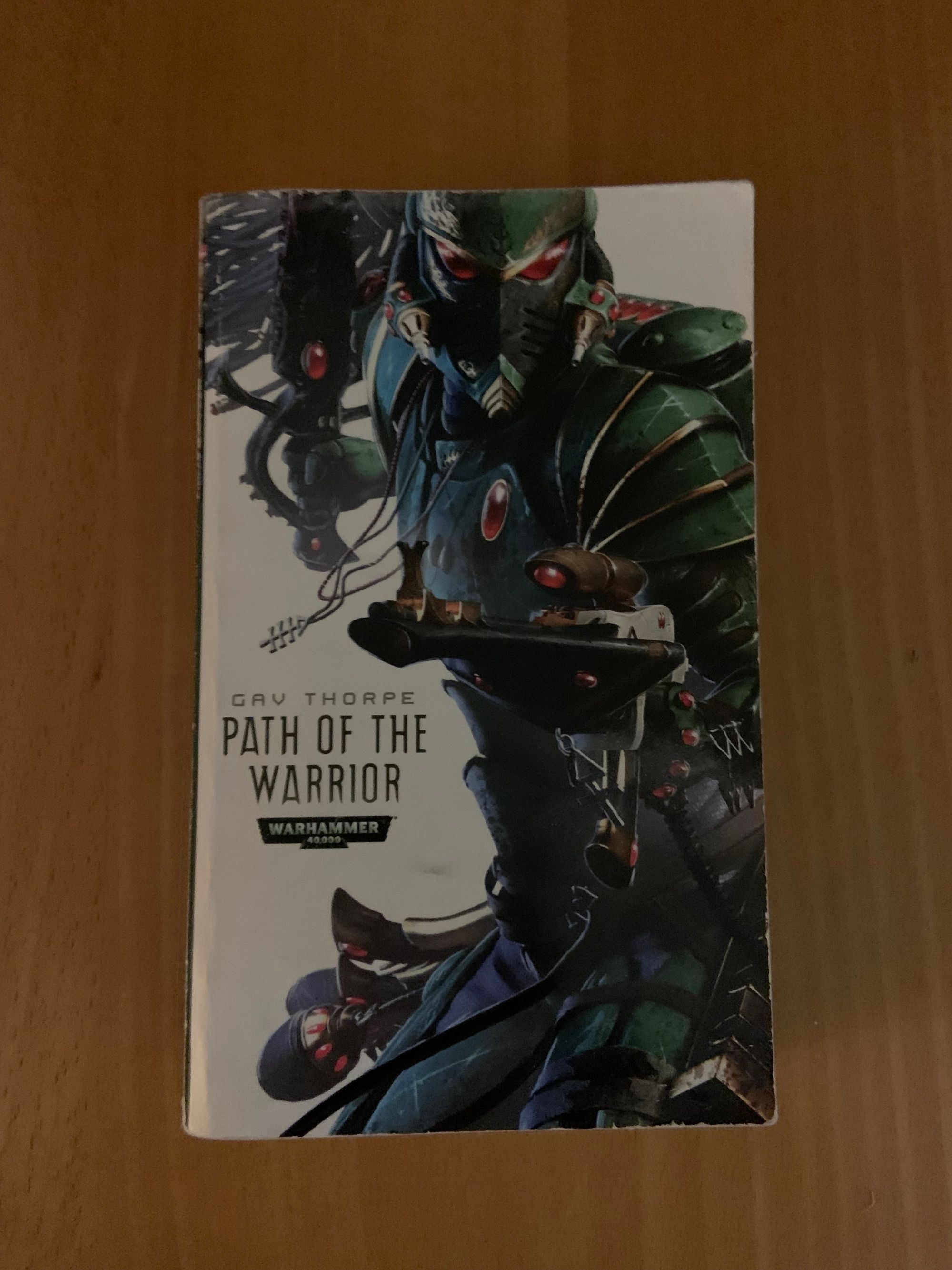
Path of the Warrior (Gav Thorpe)
While most books are written from an imperial or at least a human point of view, this book is the intro to a trilogy of books featuring the alien Craftworld Eldar (or "Aeldari", as they are known today). The Eldar are basically space elves, but in the grimdark world of Warhammer 40k, it is only natural that those elves are not just dancing around enchanted woods, playing the lute, or doing each other's hair... even though Korlandril, the first novel's protagonist, starts as an artist on one of the giant world ships of the Eldar, the Craftworld Alaitoc.
Millennia ago, the Aeldari empire spanned most of the galaxy, technologically and psychically exalted over the cruder, "lesser" species like Orks or Humans. The mind of the Aeldari tends towards extremes, however, from deep oceans of despair to the highest mountains of intense euphoria. At a certain point, the empire fell into decadence, and, without the Aeldari realizing it, their emotions echoed in the Warp dimension, slowly creating Slaanesh, the Chaos god of dark pleasure and hedonism. The birth scream of the awakening Chaos god sent out a shockwave through the galaxy, ripping Aeldari souls as well as those of psykers from other races out of their bodies and destroying the Aeldari empire, making room for the eventual ascension of the Imperium of Man. Only a few groups managed to survive the fall or its aftermath. The Craftworld Aeldari, who fled the fall on giant spaceship arks, spent their life on ascetic paths, designed to occupy their minds with tasks or crafts beneficial to Aeldari society or the individual.
Following the path of the artist, Korlandril realizes that his developing psychological needs aren't met... sending him on the Path of the Warrior to begin his training as a "Striking Scorpion", one of the Warrior Aspects of the Aeldari. However, to walk this path is to welcome some of the darkest parts of the Aeldari psyche, associated with Kaela Mensha Khaine, the god not only of war but also of cold-blooded murder...
Gav Thorpe used to be one of Warhammer 40k's game designers in the 90s (I remember quite well cursing some of his rules decisions :-D ), but he's also an accomplished writer. Befitting the refined nature of the Eldar, the writing style is complex, but it brings across the manifold of emotions of the Aeldari mind, making The Path of the Warrior a demanding read sometimes, but also brings to life an alien species.
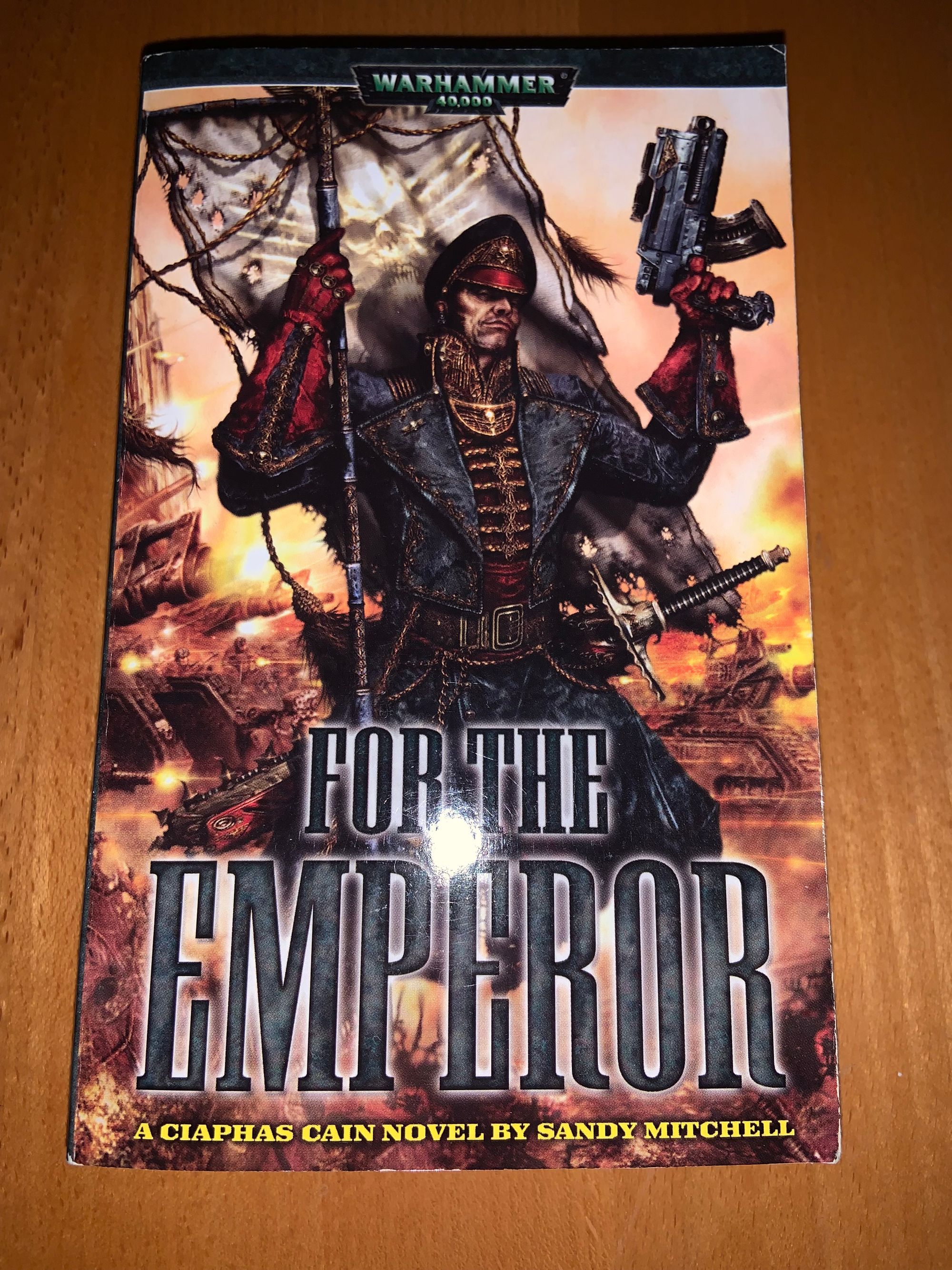
For the Emperor (Sandy Mitchell)
Commissar takes over an Imperial Guard regiment of misfits and forms them into an effective fighting force with his heroic leadership... we're talking about Gaunt's Ghosts, right? Wrong! This may be the most humourous black library title, starting the line of Commissar Cain books. The novel is presented as the memoirs of Commissar Ciaphas Cain, later redacted by Inquisitor Amberley Vail, who adds her own commentary as well as excerpts from other works for a better understanding of the "historic" report. Very much unlike Gaunt's Ghosts' Commissar Gaunt, Ciaphas Cain has no intention of performing heroic deeds, doesn't take the Imperial Faith seriously, and just tries to survive and, if possible, enjoy life. He just seems to have a habit of tumbling into dangerous situations, emerging as a hero in the eyes of his contemporaries. In this novel, Commissar Ciaphas Cain and his Valhallan regiment are sent to bring an imperial planet claimed by the Tau back under imperial control, but showing the Tau their place is only the beginning. Written in Cain's own, often sarcastic diction, the novel is enormously fun to read, challenging the stereotypes of the setting, without making it all seem too ridiculous. For every Gaunt or Yarrick there's probably at least one Ciaphas Cain in the Imperium that we'll never hear about, just trying to get by from day to day. "For the Emperor" thus lends a more human tone to Warhammer 40k, making it one of the best Warhammer 40k books of all time.
Vaults of Terra: The Carrion Throne (Chris Wright)
Then again, Warhammer 40k is not just humor and satire. The Carrion Throne shows us the throneworld of the Imperium, Holy Terra, in the last years of the 41st Millennium, from the perspective of Inquisitor Erasmus Crowl and his retinue. The atmosphere that Chris Wright creates is incredibly dense. The hives of Terra are as dark and dangerous as any other imperial world, maybe even more so, and the people populating them are ignorant and superstitious... and that doesn't exclude the Inquisition that watches the rest of the inhabitants. The creeping horror only gets worse when the Imperial palace, thought to be an impenetrable fortress, is involved. The Carrion Throne draws the picture of the imperial center of power, five seconds before the apocalypse, and if Terra goes down, you know it's gonna be bad. Haunting excitement! No list of the very best Warhammer 40k books could exclude this novel.
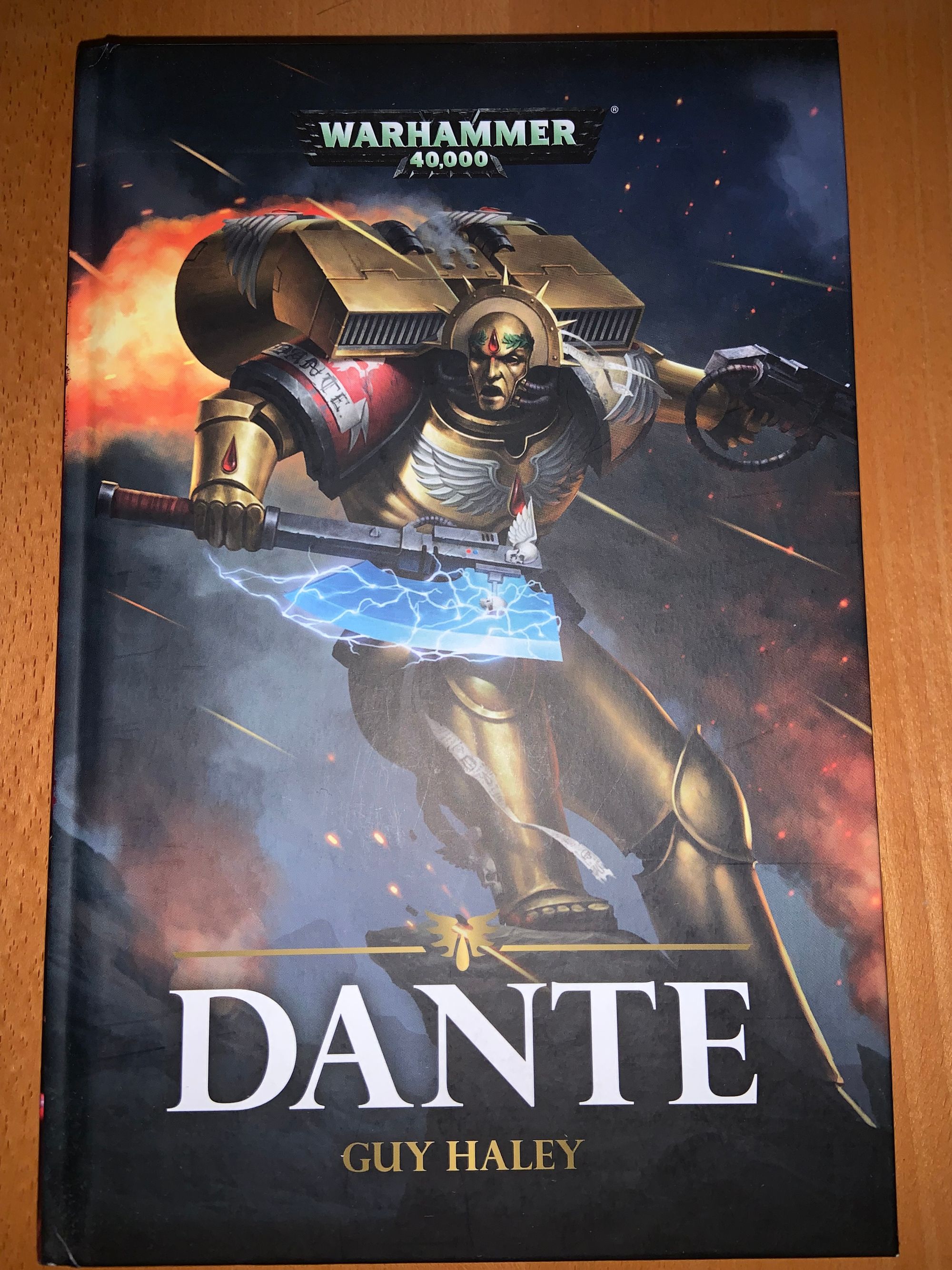
Dante (Guy Haley)
There are many heroes in Space Marine lore, but few are as great as Commander Dante of the Blood Angels, the oldest chapter master of the Adeptus Astartes. This novel deals with two topics: The early development of Dante from a simple boy on Baal Secundus into a Space Marine, and the Tyranid threat of Baal a few hundred years later. The oddities and special features of the mind of a Blood Angel are presented in detail, as is the wisdom that comes with age. Dante could be one of the most "human" Space Marine Commanders.
Mark of Faith (Rachel Harrison)
Watch out for Rachel Harrison! She is relatively new among Black Library's authors, but in my opinion, all of her work so far is above average. Mark of Faith is about the Adepta Sororitas (or Sisters of Battle), the monastic warrior nuns of the church of the Emperor, who spread the Imperial faith, chasten heretics, and protect the privileges of the Ecclesiarchy... so welcome to the heart of the grim darkness, especially as this book deals with the Sisters after the development of the Great Rift in the galaxy, a metaplot event that made the setting even darker... if that is possible. Defending the Shrine World Ophelia VII, Sister Evangeline's face is marked by warp fire with a scar in the form of the Imperial Aquila. Regarded as blessed by the Emperor, Evangeline receives a quest unlike any other: To cross the dangerous Rift into the Imperium Nihilus, where the Emperor's light doesn't shine, and search for a relic, the Shield of St. Katherine.
Mark of Faith is about hope in the face of darkness and desperation. The mood of the writing is dense and Evangeline's inner conflicts are well described. Well worth a read!
FAQs
Are there any good Warhammer 40k books?
Why, yes! Take a look at our list!
Where should I start with Warhammer 40k books?
From our list (reviews included), "First and Only", "Space Wolf" and "Eisenhorn" make a great starting point for new readers.
What Warhammer book should I start with?
From our list (reviews included), "First and Only", "Space Wolf" and "Eisenhorn" make a great starting point for new readers.
What Warhammer 40k books do I need?
If you're talking novels, give our list of classic 40k books a try! If you are looking for rules, you need at least the 40k rulebook and the Codex of the army you want to play.
What is the strongest chapter in 40K?
Probably the Black Templars, as they are fierce fanatics, have strongholds all over the galaxy and feel completely unburdened by the restrictions of the Codex Astartes that limit chapters to a thousand Space Marines.
Where should I start with 40K lore?
It really depends on which factions you are interested in. For a general, well-rounded overview, give the books on our "classics" list a try!
Is 40K hard to learn?
40k has become complex at the moment (December 2022), but fear not! A new edition is (very probably) coming in 2023!
What age are Warhammer books for?
The books are quite violent. Younger readers might prefer the "Warhammer Adventures - Warped Galaxies" line.
Who is the best Warhammer writer?
With three books on our 40k classics list, Dan Abnett is an obvious candidate.
Are black library books good?
A lot of them are! Take a look at our list!
Where do I start Black Library?
From our list (reviews included), "First and Only", "Space Wolf" and "Eisenhorn" make a great starting point for new readers.
Are the Horus Heresy audio books good?
Most Horus Heresy series books are worth reading, and the audio versions are professionally made.
Is Indomitus a good book?
Although it didn't make it to our top ten list, Indomitus is a good read.
How many Horus Heresy books should I read?
For a good overview of the Horus Heresy series, I'd recommend reading at least the intro trilogy (Horus Rising, False Gods, Galaxy in Flames) and the currently published Siege of Terra novels. If you crave more after these thirteen titles, consider the books of the Word Bearers story ark (starting with The First Heretic), as the Word Bearers novels lead you to the very beginning of the heresy. If you want tragedy, try the Thousand Sons books (Starting with A Thousand Sons). Or, you might like the eighteen novels of the Primarchs series for a selection of stories from the Great Crusade and the Horus Heresy.


